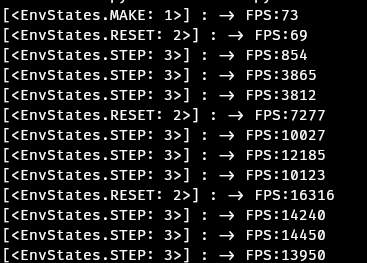Simulators that are constrained by moore's law are what we shall call hardware-accelerated simulators. So how will we go about creating our hardware-accelerated simulators?
- First we need a way track the performance of our games. I propose frames per second (FPS)
- If you can get a first person shooter to play over 60fps on your CPU (whilst listerning to your favorite song, then there is no reason your environment shouldn't otherwise you should just train on your game first person shoooter instead.
- For now, I wish to constrain this project to Combinatorial optimization games. No subjective reason
- Avoid the need for JAX or Numpy in the core library. games/environments are free to be designed with whatever tools that are required.
- I want to treat all our games as vectorized environements (specifically Asynchronous) and find out what happens. lets use all our (CPU) cores!!
For now, if you wish to add support for your game, you need to 'define' your game to run like any Gym environment.
class YourGame name:
def __init__(self,env: Env):
self.env = env
@classmethod
def make(cls, env):
return cls(env)
def compute(self):
return self.env
def step(self, *action, **kwargs):
raise NotImplementedError(f"step() is not implementd for {self}")
def reset(self, *args, **kwargs):
raise NotImplementedError(f"reset() is not implementd for {self}")
def render(self, *args, **kwargs)
raise NotImplementedError(f"render() is not implementd for {self}")
def close(self, *args, **kwargs)
raise NotImplementedError(f"close() is not implementd for {self}")And then just call it in orolo.make() and the library should do the reset.
if __name__=='__main__':
import random
DEBUG = True
seed = 1337
num_env = 4
envs = oroloEnv.make([YourGame() for _ in range(num_env)], device='async')
for episode in range(500):
obs = envs.reset(seed=random.randint(0,999)).compute()
done = False
while not done :
action = random.randint(0,9)
obss,rews, dones = envs.step(action=[random.randint(0,9) for _ in range(num_env)]).compute()
if True in dones:
breakPlease note, these are just ideas born out of too much coffee one weekend. Development will be slow and my ideas might change.
The below image shows DQN's performance on the game TicTacToe on this system.
These great tools have are also trying to create hardware-accelerated simulators/suites but follow different philosophies from us.
There is a growing number of researchers working on hardware-accelerated simulators/suites. They follow different philosophies from me but have inspired the development of this project, here is a list of related efforts:
- Jumanji: A suite of diverse and challenging RL environments in JAX.
- envpool: Vectorized parallel environment execution engine.
- Brax: JAX-based library for rigid body physics by Google Brain with JAX-style MuJoCo substitutes.
- Pgx: JAX-based classic board game environments.
- gymnax: AX-based Reinforcement Learning Environment Library
If you use oroloEnv in your research, please cite it as follows:
@software{urela2023github,
author = {urela},
title = {{OroloEnv},
url = {http://github.com/Urela/OroloEnv},
version = {0.0.2},
year = {2023},
}
Thanks to DinosoftLabs for their icon


